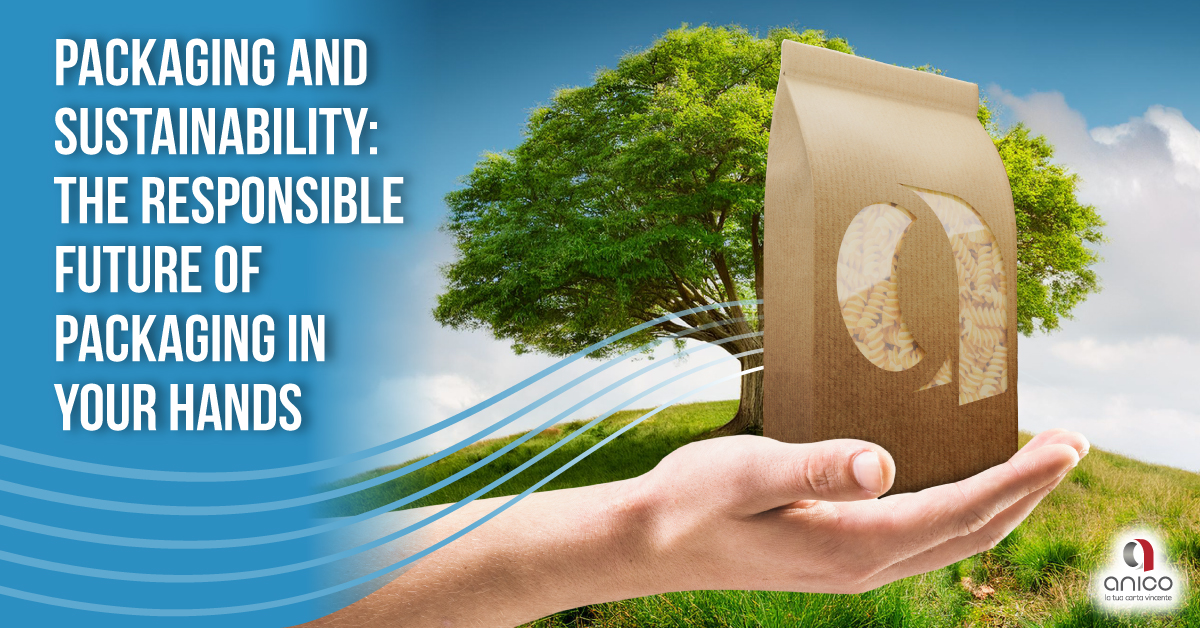The responsible future of packaging in your hands
Packaging and sustainability topics have become central in public debate and corporate strategies.
With increasing environmental awareness and growing concerns about waste disposal,mainly of food packaging, European companies are facing significant challenges in reducing the environmental impact of their packaging.
This article will explore the current trends, regulations and innovative practices that are shaping the future of sustainable packaging and how Anico Paper Flex, the market leader in this field, is addressing these challenges.
The importance of sustainable packaging for your company
Packaging and sustainability have now become an essential combination, because packaging not only serves to protect and present products, but has become a key element in the sustainability strategy of companies.
Choosing eco-sustainable packaging can contribute to:
- reduce waste, using recyclable materials;
- minimize environmental impact, through the choice of materials with low ecological impact;
- improve the brand image, responding to the expectations of consumers who are paying a lot of attention to the environment.
What materials is eco-sustainable packaging made of?
Eco-sustainable packaging is made in such a way as to have the lowest possible environmental impact and to be considered such it must be produced with natural and recyclable materials.
Packaging must therefore mainly fulfill its functions of:
- protection of the product and all its characteristics, in particular when it concerns a food product
- transportability and storage
- consumer information
- brand promotion
Trends in Sustainable Packaging
Packaging is considered sustainable when the manufacturing company puts the consumer in a position to carry out correct separate waste collection, simply and without uncertainty.
What are the innovative materials that the packaging industry is exploring that offer more sustainable solutions?
The most common raw materials used to create eco-sustainable packaging, but which perform all its main functions at the same time, are paper and cardboard, which are even more sustainable if recycled.
Paper and cardboard are also a strategic choice for companies, because they are light but resistant and this makes them ideal for storing and transporting the products they contain.
In fact, one of the factors to consider when evaluating the sustainability of packaging is also the way in which the packaging is transported and stored.
European regulations and directives
The European Union has implemented several regulations to promote sustainability in the packaging sector.
The Packaging Waste Directive which sets recycling and waste reduction targets and the strategy for plastics in the circular economy aims to make all plastic packaging reusable or recyclable by 2030.
These are some recycling target numbers: By 2025, at least 65% of packaging waste must be recycled, with a target of 70% by 2030.
As regards the objective of recycling specific materials, these are the indications:
- paper and cardboard: 85% recycling by 2025;
- plastic at least 30% recycled by 2025;
- wood, 50% recycled by 2030.
Many challenges still to be faced
Despite the progress, however, there are still many challenges to face in the field of packaging and sustainability:
- high costs, because innovative sustainable materials can be more expensive than traditional options.
- insufficient recycling infrastructure, in fact not all European countries have efficient collection and recycling systems.
- consumer education, because it is essential to raise consumer awareness of the importance of choosing products with sustainable packaging.
How does Anico Paper Flex support you in the packaging and sustainability challenge?
The future of packaging is essentially a return to the past, to the use of one of the materials that has accompanied man for centuries: paper
Our history began with the production of square bottom paper bags over 35 years ago.
With the introduction of innovative machinery Anico has become a point of reference in the paper packaging sector and is ready to support you in the challenge of sustainability.
We are leaders of paper square bottom bags, with additional window, to make food products visible to the consumer, but we also make doypacks, practical bags that stand up on their own, capable of storing various products.
Adopting sustainable packaging today is not only an ethical responsibility, but also a strategic opportunity.
Companies that embrace this transition can not only improve their reputation, but also conquer a market share that is increasingly sensitive and attentive to environmental issues.

